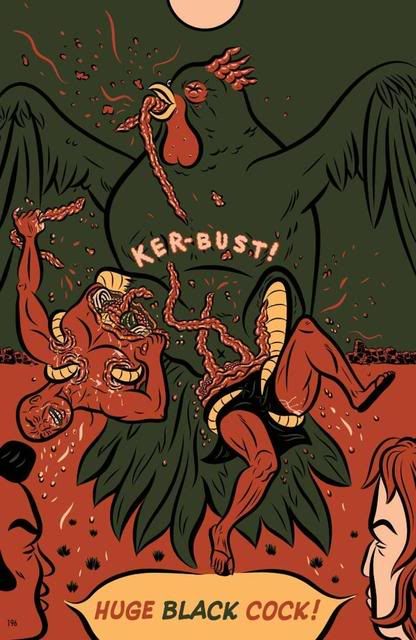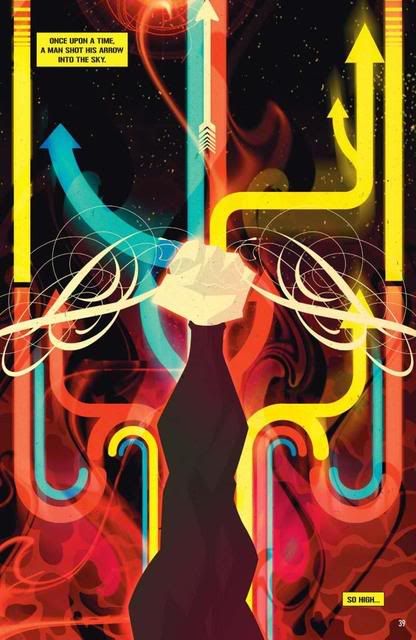Happiness Is A Warm Popgun: Part II of Jeff's Talk with Adam Knave
/![]() Yesterday was the first part of my interview with writer/editor Adam Knave, wherein I did a terrible job of getting him to talk about the third volume of Popgun, out today. Today, I do a slightly better job, and although I'm still meager with the art, it doesn't look quite as tiny.
Yesterday was the first part of my interview with writer/editor Adam Knave, wherein I did a terrible job of getting him to talk about the third volume of Popgun, out today. Today, I do a slightly better job, and although I'm still meager with the art, it doesn't look quite as tiny.
The interview should conclude tomorrow, with discussion about Knave's webcomic and influences.
Part II is after the jump.
JL: Anything else you want to add about Popgun?
AK: It’s awesome and you should buy it? It’s funny; my mother is mostly an editor and also a writer. My father was a writer first and would occasionally edit. And I grew up self-identifying—I’m not like one of those kids who was fifteen, ‘I’m a writer!’ But in my head, I’m always that guy who writes stuff, and never an editor.
And outside of D.J.’s story and the occasional thing, you know, work on websites and doing columns, I haven’t been an editor…until I got thrown into this. And it’s been an incredible learning curve. D.J. Kirkbride is one of the most amazing proofers I’ve seen in my life. The man has a gift. And the fact that Popgun comes out roughly every eight months? It kills me that anyone gets the book done. Just the amount of work, and how strong the book is. If you look at Book One or Two or Three, there really aren’t bad stories.
Part of why I agreed to the book was I was just a fan of it. Because anthologies traditionally don’t really sell, unless—and again Rantz is a god among men for pulling together Comic Book Tattoo—and let’s face it, he was kind of smart: yeah, put Tori Amos’ name on an anthology, it’ll sell. Yeah, that works.
But Popgun had nothing for it but ‘let’s make this incredibly good.’ And that’s kind of where we all sit when we work on it. It’s—I’ve been involved in publishing too long, I’ve seen too many teams of people who just really work together on a project for the money because they’re there today, and they think they’re supposed to be. But with Popgun, everyone involved in it is honestly just there for the love and are amazingly good professionals. And I think we end up with an amazing book full of people that produce…'Bastard Road.' Every chance I get I mention 'Bastard Road,' let me tell you. I am such a hardcore fan of that strip.
JL: That’s the [Cockfighter Blues]?
AK: Yeah. I actually told Brian I want the panel of “Giant Black Cock!” printed on velvet, and I will hang it framed in my living room. I’m not kidding.
 Bastard Road: Cockfighter Blues by Brian Winkeler and Dave Curd
Bastard Road: Cockfighter Blues by Brian Winkeler and Dave Curd
But it’s such a joyous thing. It’s that weird mix of everything comics can do, and a lot of Popgun is about that potential of comics. Don’t we all just keep hearing this, you know, ‘oh, well, comics. Just the superhero stuff is all that actually sells and nobody is really innovating anything…unless your name is Grant Morrison,’ unless you’re attacking Grant Morrison that day, in which case he’s not.
But you hear like three names of people who innovate in comics, and I’m telling you, we have like four hundred and seventy-odd pages of people who innovate in comics, hands down. These are people who are just doing incredibly new things with the medium. And it’s brave, and it’s just interesting to see from a production thing—hey, I get to read this stuff first—al of these stories that don’t always have anything in common, but you look through the book and you can feel this thread. You know, that music sensibility isn’t in every page. People aren’t going, ‘let me write a comic based on a rap song.’ But you do feel that sensibility of—before Top Forty Stations became huge and, you know, I grew up in New York, so I’m going to assume the rest of the world was like New York. You know, what became of Top Forty stations back in the early ‘80s played some really weird stuff. They were playing ‘Mercy Seat’ by Nick Cave on the god-damned radio, not a song you would actually get away with playing today.
But they would take these chances, and you had DJs who didn’t have orders to play these four records over and over, and you had people creating something interesting. Even if you didn’t like it, you had to respect it. And I think that’s really where Popgun lives. Because I don’t like every story in the book. I would be lying if I said I did, let’s face it. There’s too much stuff in there to love every story in the book.
But even the ones where I sit there and go ‘Really? This is--? Uh, okay,’ I consistently respect the craft that went into it, because everyone is at a really, really high level here. You have to respect the creators who push this stuff out, and you can tell they just kind of gave their all for it for, again, an Image anthology that—yeah, Volume One won a Harvey, and that’s awesome and well-deserved, I think. But I think it’s not going to buy these cats a car, you know? Let’s face it.
And I get mail, constantly, from people who are not unknown in the industry, who go, ‘I want to be part of Popgun.’ And that just amazes me. Not because, ‘Wow, they like us.’ But just that word is spreading and we’re becoming this place you go for the experiments, for the fun of it, for ‘let’s see what comics can do for a change,’ instead of being told what comics can do.
 Vertex by Juan Doe
Vertex by Juan Doe
We tell people, ‘play. What’s the story you’ve always wanted to tell? Let’s see that one.' We actually just got a list of pitches from somebody whose name I can’t remember at all, who’s going to do a story for us, and he gave us these three choices. Here he is, a nice guy, he’s giving us options, that’s kind of awesome. ‘Which one do you want?’
And me, D.J., and Anthony all took a look at this list and we all universally, without talking to each other, went for the strangest, most experimental one in the batch. We’re just like, ‘we want to see you pull off that.’ Because no one’s done that yet.
And you don’t include that really unique, special weird thing unless it’s the one you really want to do. No one ever includes that in the list unless that’s the one they want. So that’s the one we’re going to go for. We want people to tell those stories that they really are fully invested in, because you can see that investment on the page.











